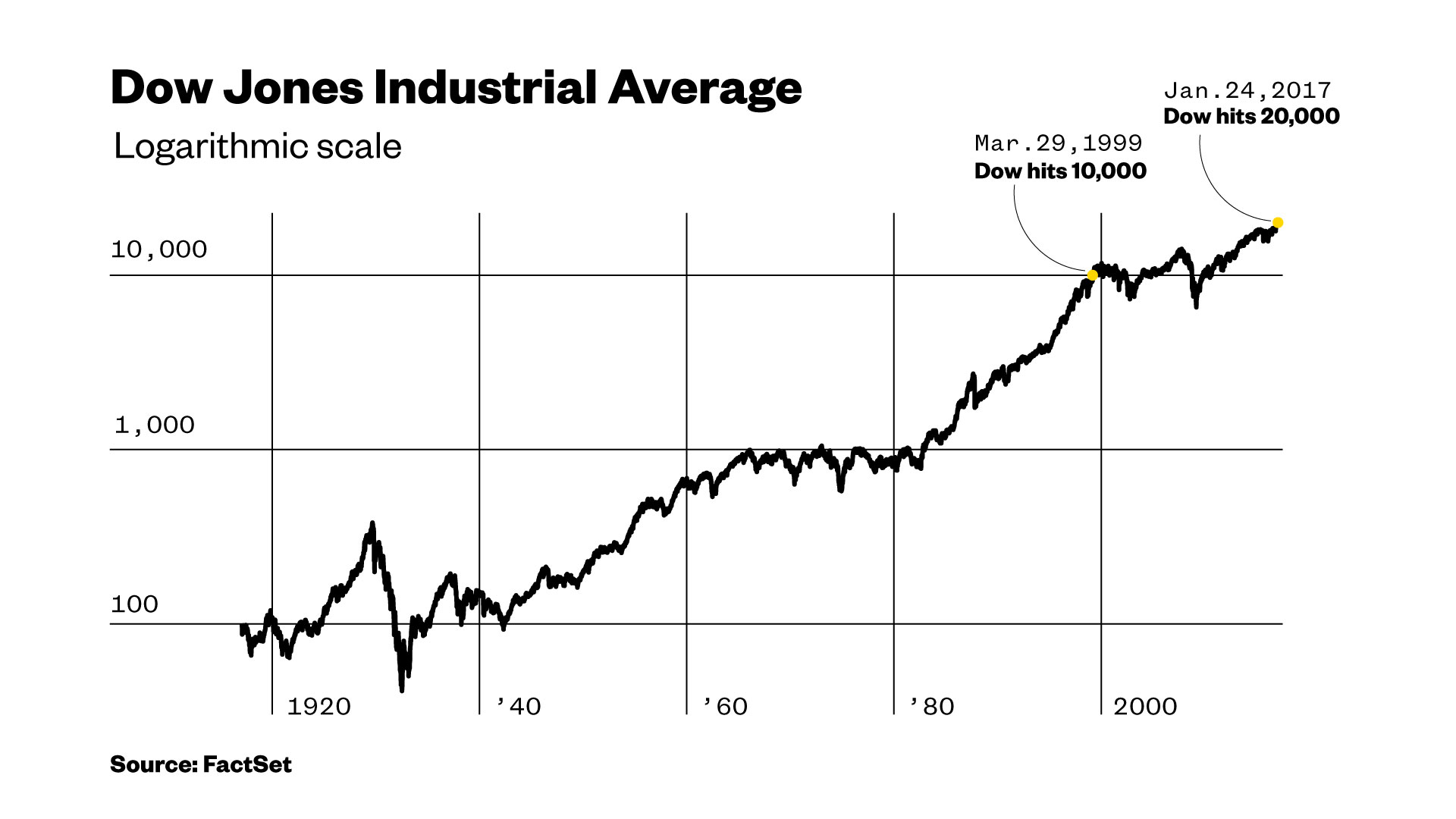Here’s the truth about Dow 20,000 that no one else will tell you: It’s just a round number. Seriously.The Dow Jones Industrial Average climbed to a new high of more than 20,000 during Tuesday’s trading day, as investors pushed heavy industry stocks like equipment-maker Caterpillar higher in hopes that these corporations would get a healthy cut of President Donald Trump’s highly anticipated infrastructure plan.But let’s be clear: There’s nothing important or magical about Dow 20,000. The Dow, a basket of 30 large, blue-chip stocks, is one of the most familiar gauges of the U.S. stock market. True, there are some indications that people — and investors are people, after all — fixate on round numbers, a phenomenon that behavioral economists call “anchoring.” And anchoring can influence investor behavior.But the fact that the Dow hit 20,000 doesn’t mean the market will keep going up. Nor does it mean that the market has topped out. The reason it’s getting so much attention is largely because it’s easier to say “Dow 20,000” than “Dow 19912.71,” where the index closed Thursday.That doesn’t mean that it’s bad news. The stock market went up. That’s good for the roughly 49 percent of U.S. families that own stocks, according to Federal Reserve data.It’s even better for the people who own the most stocks, i.e., the richest Americans. For the record, in 2013 the average value of stock holdings of the richest 10 percent of American families was $970,000. Families in the bottom half of American earners had average accounts of about $54,000.In other words, your pittance of a 401(k) might look a bit better today, but card-carrying members of the one percent could see their wealth rise on the order of millions of dollars.Still, it must be said that the stock market has done far better than many thought it would in the aftermath of Trump’s election. Stocks have risen on a combination of expected tax cuts, lighter regulations, and the great gobs of taxpayer money Trump is proposing to spend. Ahead of the election, the stock market had been roughly flat for months. Since the vote on Nov. 8, the Dow has risen more than nine percent.That said, the rising stock market doesn’t necessarily mean the U.S. economy is in great shape. (We’ll get an update on that with the U.S. GDP report that’s due on Friday.)Over the last 30 years or so, the U.S. stock market has often looked terrific right up until it goes over a cliff — sometimes along with the entire economy. I’m not saying that’s going to happen anytime soon. But it’s just something to keep in mind.
The Dow, a basket of 30 large, blue-chip stocks, is one of the most familiar gauges of the U.S. stock market. True, there are some indications that people — and investors are people, after all — fixate on round numbers, a phenomenon that behavioral economists call “anchoring.” And anchoring can influence investor behavior.But the fact that the Dow hit 20,000 doesn’t mean the market will keep going up. Nor does it mean that the market has topped out. The reason it’s getting so much attention is largely because it’s easier to say “Dow 20,000” than “Dow 19912.71,” where the index closed Thursday.That doesn’t mean that it’s bad news. The stock market went up. That’s good for the roughly 49 percent of U.S. families that own stocks, according to Federal Reserve data.It’s even better for the people who own the most stocks, i.e., the richest Americans. For the record, in 2013 the average value of stock holdings of the richest 10 percent of American families was $970,000. Families in the bottom half of American earners had average accounts of about $54,000.In other words, your pittance of a 401(k) might look a bit better today, but card-carrying members of the one percent could see their wealth rise on the order of millions of dollars.Still, it must be said that the stock market has done far better than many thought it would in the aftermath of Trump’s election. Stocks have risen on a combination of expected tax cuts, lighter regulations, and the great gobs of taxpayer money Trump is proposing to spend. Ahead of the election, the stock market had been roughly flat for months. Since the vote on Nov. 8, the Dow has risen more than nine percent.That said, the rising stock market doesn’t necessarily mean the U.S. economy is in great shape. (We’ll get an update on that with the U.S. GDP report that’s due on Friday.)Over the last 30 years or so, the U.S. stock market has often looked terrific right up until it goes over a cliff — sometimes along with the entire economy. I’m not saying that’s going to happen anytime soon. But it’s just something to keep in mind.
Advertisement
